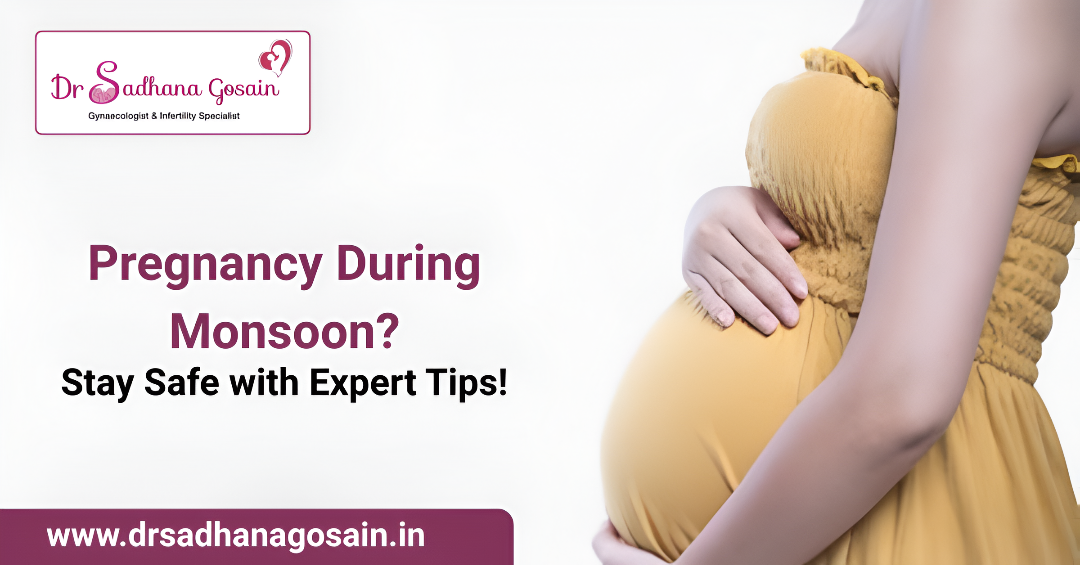
Pregnancy During Monsoon? Stay Safe with Expert Tips!

Pregnancy Care Tips in Monsoon: The monsoon season brings much-needed relief from the scorching summer heat, but for pregnant women, it also presents some unique challenges. High humidity, risk of infections, seasonal flu, and slippery surfaces can make this time a bit tricky for expecting mothers.
Whether you’re in your first trimester or nearing your due date, it’s crucial to follow specific Pregnancy Care Tips in Monsoon to ensure your health and your baby’s safety. Here’s a comprehensive guide to staying safe, dry, and healthy during this beautiful — yet unpredictable — season.
Why Monsoon Needs Extra Caution During Pregnancy?
Pregnancy brings many physical and hormonal changes that affect your immunity, digestion, and overall well-being. Monsoon weather, with its dampness and sudden temperature drops, can increase the chances of:
-
Viral and bacterial infections
-
Water-borne diseases
-
Skin rashes and fungal infections
-
Slippery accidents due to wet surfaces
-
Mosquito-borne illnesses like dengue and malaria
To prevent these complications, let’s explore some essential monsoon pregnancy care tips recommended by health experts and trusted Gynecologist in Delhi.
Pregnancy Care Tips in Monsoon
1. Boost Immunity with a Nutritious Diet
A strong immune system is your first line of defense against seasonal diseases. Include immunity-boosting foods like:
-
Citrus fruits (Vitamin C)
-
Tulsi and ginger in warm water
-
Homemade soups
-
Protein-rich lentils
Also, avoid roadside or uncovered foods that may be contaminated during monsoon.
📌 Internal Tip: Curious about what fruits are ideal during pregnancy? Check out our blog on What are The Best Fruits to Eat in Pregnancy?
2. Stay Hydrated – Even in Humid Weather
During monsoon, we often feel less thirsty due to high humidity. However, hydration is crucial during pregnancy to prevent urinary tract infections (UTIs) and maintain amniotic fluid levels.
Drink at least 8-10 glasses of boiled or filtered water daily. You can also have coconut water or buttermilk for hydration and digestion support.
3. Avoid Stagnant Water – Prevent Mosquito Breeding
Monsoon is notorious for mosquito-borne illnesses like dengue, chikungunya, and malaria — all of which can be harmful during pregnancy.
Here’s how to avoid mosquito bites:
-
Use mosquito nets and natural repellents
-
Wear full-sleeved, loose cotton clothes
-
Do not allow water to stagnate around your house
4. Dress Light and Comfortable
Opt for breathable fabrics like cotton and linen that absorb sweat and reduce skin irritation. Avoid tight or synthetic clothes which can cause fungal infections in humid weather.
Pro tip: Keep an extra pair of dry clothes when stepping out to avoid staying wet for long.
5. Keep Feet Dry & Clean
Due to mud and puddles, walking outside during monsoon can increase the risk of fungal foot infections and slipping.
-
Always wear anti-skid waterproof footwear
-
Wash your feet with antiseptic soap after returning home
-
Pat them dry and apply antifungal powder if needed
6. Maintain Personal Hygiene
The chances of bacterial infections are high during this season. Maintain good hygiene by:
-
Taking a warm bath daily with antiseptic liquid
-
Changing innerwear twice a day
-
Using soft and clean towels
These small hygiene habits go a long way in keeping infections at bay.
7. Exercise Indoors with Care
While daily walks and exercise are important during pregnancy, avoid slippery outdoor areas during the rains. Instead, try:
-
Prenatal yoga indoors
-
Stretching exercises under supervision
-
Gentle breathing techniques
Always consult your doctor before starting any new workout routine.
8. Plan Doctor Visits Carefully
If you’re pregnant during the monsoon, always schedule prenatal appointments during the day to avoid evening rains. Keep a spare umbrella, raincoat, and waterproof bag for your documents.
If you’re looking for a trusted Gynecologist in Delhi to guide you through your pregnancy journey, consult Dr. Sadhana Gosain — a renowned name in women’s health and maternity care.
9. Avoid Raw and Street Foods
Monsoon increases the risk of food poisoning due to contaminated water and poor hygiene. Pregnant women should strictly avoid:
-
Chaats, golgappas, and roadside juices
-
Raw salads from unknown sources
-
Undercooked meats or unpasteurized milk
Instead, opt for freshly cooked homemade meals and properly washed fruits and vegetables.
10. Carry Emergency Essentials
Always carry these essentials when stepping out in the monsoon:
-
Water bottle
-
Healthy snack (banana, nuts)
-
Dry napkins/tissues
-
Doctor’s prescription or pregnancy ID card
-
Emergency contact numbers
This preparation can save time and stress in case of any unexpected rain or health concern.
Signs to Watch Out For
Call your doctor immediately if you notice:
-
Persistent fever or body ache
-
Rashes or itching in private areas
-
Swelling in hands/feet
-
Diarrhea or vomiting
-
Unusual vaginal discharge
Prompt care is essential to avoid complications.
View this post on Instagram
Consult a Specialist for Monsoon Pregnancy Guidance
Every pregnancy is unique, and monsoon can affect each woman differently. It’s always best to stay in touch with your gynecologist and discuss any changes in your body, diet, or symptoms.
If you’re in Delhi and expecting during this rainy season, book an appointment with the highly experienced Gynecologist in Delhi — Dr. Sadhana Gosain — for safe and comprehensive prenatal care.
Conclusion – Pregnancy Care Tips in Monsoon
Pregnancy during monsoon can be a beautiful and cozy experience if handled with a little extra care. By following these Pregnancy Care Tips in Monsoon, eating right, staying dry, and consulting your gynecologist regularly, you can enjoy the rainy season while keeping your baby safe and healthy.
Remember — a little caution can bring a lot of comfort!

